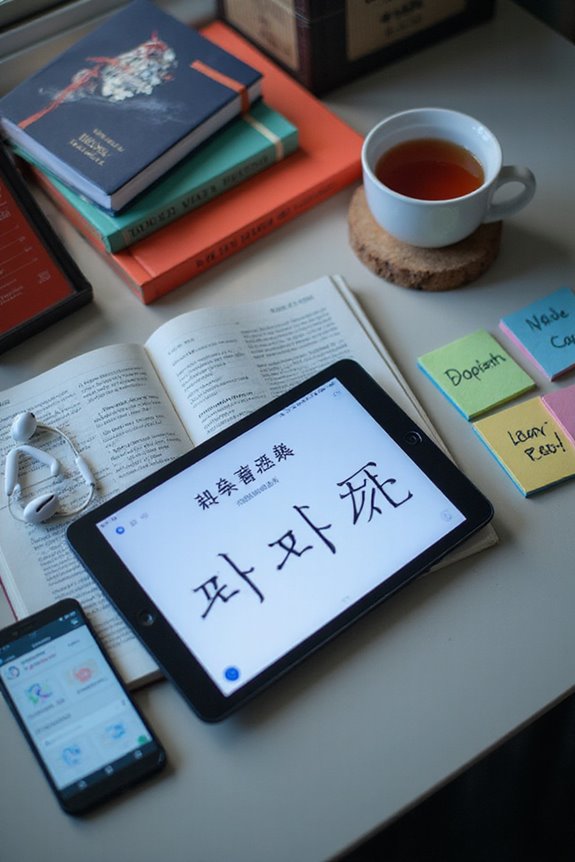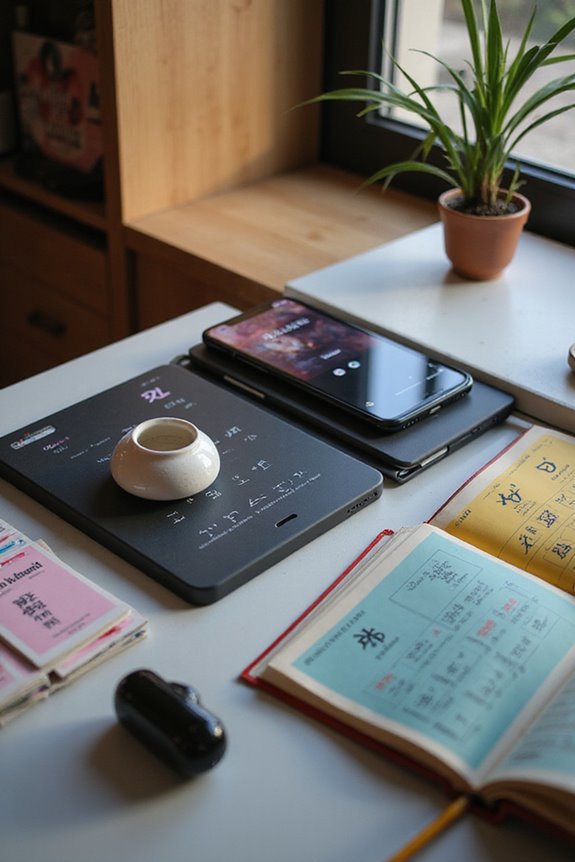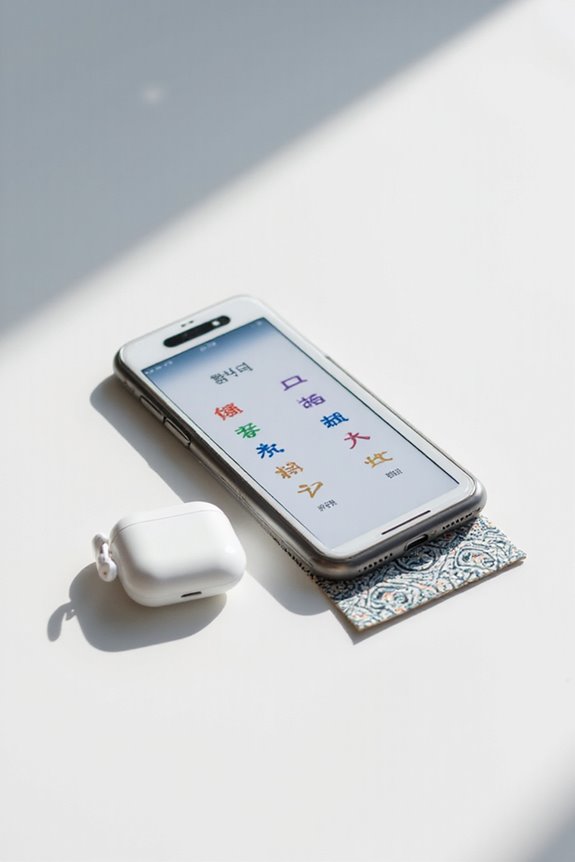Korean language learning materials include textbooks, online resources, flashcards, and multimedia tools, all aimed at enhancing language acquisition. For instance, textbooks like “Learn Korean for Adult Beginners” cater to various proficiency levels. Online platforms such as Talk To Me In Korean provide video lessons that complement traditional materials. Additionally, flashcard apps use spaced repetition to aid vocabulary retention. By exploring these resources, learners can effectively improve their skills in listening, speaking, reading, and writing. More insights await as we explore each category.
Key Takeaways
- Key textbooks, like “Korean Immigration and Integration Program,” cater to different proficiency levels, focusing on practical language skills.
- Online resources, such as video lessons from Talk To Me In Korean, enhance learning through diverse media for all levels.
- Flashcards and apps, including Anki and Quizlet, utilize spaced repetition to aid vocabulary retention and language acquisition.
- Vocabulary lists and interactive quizzes provide essential words and engaging methods for effective learning and retention.
- Audio and video resources, like KoreanClass101, offer comprehensive lessons that support auditory and visual learning approaches.
Textbooks and Courses
When exploring the landscape of Korean language learning materials, several key textbooks and courses emerge as essential resources for learners. Textbook selection plays a crucial role in effective language acquisition, as many publishers provide materials tailored for specific audiences, such as expats and international students. For example, the “Korean Immigration and Integration Program” offers levels from pre-beginner to intermediate, emphasizing practical skills. The course structure generally divides language skills into listening, speaking, reading, and writing, enhancing focused learning. Additionally, resources like “Beginning Korean 1” integrate online supplements for a multimedia approach, while “College Korean” effectively separates speaking from writing. Accessibility in major bookstores further supports learners in choosing the right materials for their individual needs and goals. Comprehensive resources like Learn Korean for Adult Beginners provide structured support for learners at various levels of proficiency.
Online Resources

In the domain of online resources for learning Korean, we’ve discovered a diverse array of tools designed to enhance language acquisition through various media. For video lessons, platforms like Talk To Me In Korean offer content for all proficiency levels, while universities like Sogang and Seoul National provide structured programs focused on dialogue and self-learning. Additionally, audio resources from Rocket Languages and podcasts cater to different learning needs. Engaging with online communities, such as those found in Talk To Me In Korean, enhances our journey by fostering interaction and support. Furthermore, many programs integrate cultural elements, enriching our understanding through platforms like KOSNET and the Korean Language Education Center, making language learning a more holistic experience. Incorporation of active learning techniques is essential for improving pronunciation and fluency in conversational Korean.
Flashcards and Apps

While we explore the benefits of using flashcards and apps for learning Korean, it’s essential to recognize their role in vocabulary retention and language acquisition. Flashcard benefits include flexibility and ease of use, making them ideal for short study sessions. Digital tools like Anki and Quizlet leverage spaced repetition, ensuring we focus on harder concepts more frequently. This enhances both user engagement and learning efficiency. Flashcards can cover Hangul, vocabulary, phrases, and even basic grammar rules, while often including audio or visual elements to engage multiple senses. By consistently reviewing these flashcards daily, we help maintain long-term memory retention, ultimately allowing us to apply vocabulary effectively in real-life situations, enhancing our overall learning experience. Additionally, choosing flashcards made from durable materials ensures they withstand frequent use, further supporting effective learning.
Vocabulary and Grammar

Vocabulary and grammar are fundamental components of mastering the Korean language, as they form the building blocks for effective communication. When we explore vocabulary context, we might utilize resources like vocabulary lists that include thousands of essential words tailored for different proficiency levels. Interactive quizzes enhance retention, allowing us to learn through engaging methods. On the grammar side, understanding the basic Sentence-Object-Verb (SOV) structure can greatly impact our ability to formulate correct sentences. Additionally, grasping grammar nuances such as particle usage and verb conjugation aids in expressing time and negation accurately. Extensive guides and textbooks provide detailed explanations, ensuring a stronger foundation for both written and spoken Korean.
Audio and Video Learning

Audio and video learning resources play an essential role in enhancing our Korean language acquisition, as they provide auditory and visual stimuli that cater to diverse learning styles. Platforms like TalkToMeInKorean offer structured audio exercises, such as the “Listen & Repeat” course, to reinforce pronunciation and listening skills. KoreanClass101 features hundreds of audio and video lessons, catering to all proficiency levels, from absolute beginners to advanced learners. GoBillyKorean provides audio content linked to educational books, such as “Korean Made Simple.” Additionally, YouTube channels like Korean with Miss Vicky deliver interactive video lessons that incorporate listening tips and practice techniques. By utilizing these resources, we benefit from engaging methods that facilitate effective language learning, making progress more manageable and enjoyable.
Free Resources
Numerous free resources are available for learners interested in mastering the Korean language, providing valuable opportunities to enhance our skills without financial commitment. Free websites, such as How To Study Korean and 90 Day Korean, offer structured beginner materials that cover essential vocabulary and grammar. We can access thorough lessons that break down complex concepts into manageable segments. Platforms like the Online King Sejong Institute provide interactive courses that include quizzes for reinforcement. Additionally, specialized platforms like Let’s Learn Hangul engage us in learning the alphabet through games. Educational institutions, including Sogang University, deliver well-structured courses that include cultural insights, ensuring a holistic learning experience. These resources are instrumental in our pursuit of Korean language proficiency. Many of these platforms emphasize practical vocabulary to enhance communication skills in real-life situations.
Recommended Study Strategies
When we approach the study of Korean, adopting effective strategies can greatly enhance our learning experience and outcomes. Prioritizing structured practice is essential; we should create manageable daily routines that incorporate reading, writing, speaking, and listening. This not only reinforces vocabulary retention but also fosters habit formation. Immersive exposure plays a key role as well; dedicating 20-30 minutes daily to authentic Korean media, like dramas or music, allows for natural language absorption. We can also engage with language learning tools, utilizing apps such as Duolingo or Memrise, which combine gamification with structured lessons. Additionally, participating in cultural activities, attending language exchanges, and consistently applying Korean in daily scenarios helps solidify our language skills through real-world practice. Incorporating educational products like flashcards can further support vocabulary retention and enhance the overall learning experience.
Frequently Asked Questions
How Do I Choose the Right Learning Materials for My Level?
When we assessed our levels, we found that combining video lessons and interactive tools worked best. For instance, our friend thrived with structured courses. It’s essential we match material types to our skills for maximum growth!
Can I Learn Korean Without Attending a Formal Class?
Absolutely, we can learn Korean without formal classes! With self-study resources and online courses, we’ll find structured pathways and flexible options, allowing us to immerse ourselves in the language at our own pace.
What Are the Best Methods for Improving Speaking Skills?
Imagine planting a garden; we nurture our speaking skills with elements like conversation partners and consistent practice. Engaging regularly helps us blossom, transforming efforts into fluency—let’s embrace every opportunity to chat and grow together!
How Often Should I Study to See Progress?
To see progress, we should focus on consistent study frequency—daily practice, even in short sessions. Progress tracking helps us monitor our growth and remains motivated as we advance in our Korean language journey.
Are There Any Tips for Staying Motivated While Learning Korean?
To stay motivated while learning Korean, let’s focus on goal setting and using reward systems. By setting achievable milestones and celebrating our progress, we can maintain our enthusiasm and continue enjoying the journey together.





